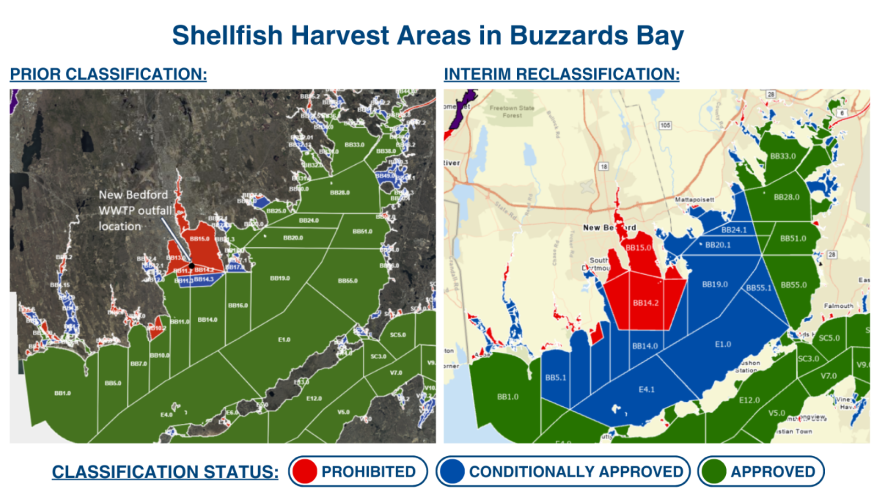The state is issuing a shellfish closure in parts of Buzzards Bay in an area, following guidance from the U.S. Food and Drug Administration (FDA).
Officials concluded a bigger buffer zone is needed between the outflow from the New Bedford and Fairhaven Wastewater Treatment plant and the area where shellfishermen are growing and harvesting.
Bob Glenn, deputy director of the Division of Marine Fisheries (DMF), said as filter feeders, bi-valve shellfish are highly vulnerable to contamination from polluted waters, which can create health issues if consumed.
“Because municipal waste — even treated municipal waste — has a fair amount of E.Coli in it, it basically can lead to a whole host of different gastrointestinal illnesses,” he said.
According to officials, the closure will impact some recreational shellfishermen, the city of New Bedford, which had hoped to open up an aquaculture industry within the Clark's Cove area, and two quahog harvesters — effective immediately.
“We're not closing all the area that they fish, we're closing a portion of the area that they fish,” he said. “If additional testing or additional evidence is brought to show that this area can be smaller, DMF would consider that.”
Glenn added that 6,901 acres of New Bedford Harbor are currently closed to shellfishing in the area around the outfall, but there’s nothing specifically wrong with the plant or its treated water. The need for a larger buffer zone was caused by a growing population on the South Coast, he said.
The FDA originally pushed the state close the majority of Buzzards Bay to shellfishing, which would affect aquaculture operations for eight South Coast and Cape Cod towns.
State officials said preliminary modeling results found that over 103,000 acres of Buzzards Bay could need to be reclassified as “Prohibited” to comply with the FDA’s National Shellfish Sanitation Program.
But in an interim plan, DMF opted to issue 82% smaller closure, and only expanded the “Prohibited” safety zone around the wastewater treatment outfall by 11,310 acres. They also reclassified the surrounding areas in Buzzards Bay as “Conditionally Approved,” or open to harvest except under emergency conditions like sewage overflows.
To ensure they’re on top of public health concerns, DMF officials said they’ll expand their water quality monitoring program and bacterial and viral testing of shellfish tissue.
Glenn said DMF wanted to minimize impacts to local shellfish farms that have no history of causing illness.
“If it turns up that those shellfish at those farms are positive for high viral load, then we would be back back to this worst case scenario,” he said. “And so we're hoping that doesn't happen.”








